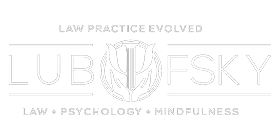Below I have summarized five suggestions to help clients move more mindfully through the divorce process: Settle In contemporary American society, most of us are highly conditioned to avoid or turn away from difficult experiences, emotions, etc. The fracturing of a family unit or severance of a love relationship can precipitate fear about the future, […]
Category: Law Practice
Most people seeking mediation services for the first time are doing so in search of less contentious, more cost-effective solutions to conflict. The threshold factors in assessing whether a particular situation is ripe for mediation are the readiness, willingness, and ability of all parties directly involved in the conflict to open and listen to divergent […]
Much of suffering can be tied to some deeply conditioned notion that we have some fundamental baseline of “happiness.” When some event, stimuli, or phenomenon is interpreted as “bad,” “unpleasant,” or “painful,” we almost instinctively engage strategies to obtain something we interpret as “good,” “pleasant,” or “pleasurable,” to return our condition to this baseline. Such […]
The mind seems to incessantly scan the environment for problems to solve. This active intellectual engagement with our environment likely served to ensure our survival as a species over millions of years as immediate physical dangers routinely confronted us in more primitive times. The mind seeks problems to solve largely within the parameters of cause […]
The issue of spousal support, especially when involving highly disparate incomes of a separating couple, is one of the most challenging areas of the divorce process. Underlying the complexity are fundamental notions of “fairness” that may significantly differ for each spouse. To successfully deal with the issue of spousal support in a way that minimizes negative […]
In working with clients to break through learned conditioning and habitual reactions that have led to, or exacerbated, legal disputes, holistic law strives to tap into the inner wisdom of participants as the primary source of optimal solutions. In orienting the identification of solutions towards clients, holistic law presents a fundamental challenge to the entrenched […]
Partners facing marital breakdown typically are confronted with deep fears and insecurities that can trigger a wide range of emotional reaction. Divorce often has serious implications in family relationships, finances, daily routines, and can shatter one’s sense of security. Divorce involving children can magnify these challenges as well as pose serious long-term harmful consequences especially […]
Through evolution, as an important means of survival, it was often critical when faced with challenges in meeting our basic needs that we were able to identify a cause in the environment that we could then act upon to remove the current obstacle. In many of these primordial situations, if one were to just do […]
Mindfulness has at its core the cultivation of a heightened ability to consciously connect with present-moment experience. Doing this often involves a process over time of dis-identification from “ego” or thought-driven notions about how “I am” or “you are,” as a “separate” individual. When we remain stuck in such learned conditioning, we are far more […]
Legal problems tend to involve life situations that may prompt examination of the past and fears about the future. In particular, one may begin to examine his or her role in bringing about the current situation a s a result of past actions and/or decisions. He or she may also worry about how the future […]
